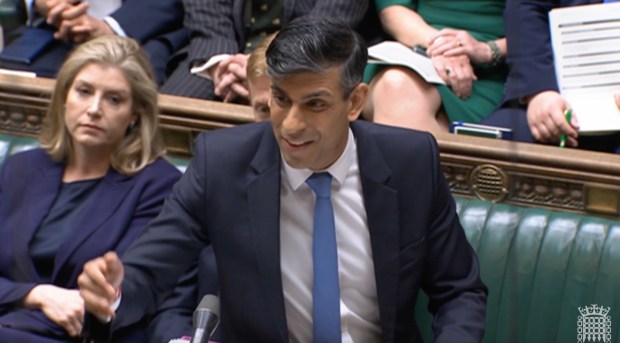Yesterday’s Times carried a report that will only add to Sir Keir Starmer’s troubles. It quoted several members of the shadow ministerial team suggesting that Starmer is dull and unimpressive.That will only sharpen the perception, held by quite a few Westminster people, that the Labour leader isn’t doing as well as he should be, given the government’s weaknesses and failings.
‘Keir Starmer is not dragging his party down but he’s not transforming its fortunes either’. That was the conclusion of a New Statesman analysis a few weeks ago, and probably a fair one. The problem for Starmer is the fact that Labour needs that transformation. One of the most overlooked facts of political life is just how badly Labour did in 2019. That very poor performance means it would take something truly impressive and borderline historic for Labour to win a majority next time around.
Roughly speaking, it would take the sort of ten-point swing that Tony Blair got in 1997 to give Starmer’s Labour even the smallest of Commons majorities. And Keir Starmer is not Tony Blair. Hence the range of likely outcomes of the next election run from a modest Tory majority (perhaps under a new leader) to a hung parliament with Labour as the largest party and struggling to govern.
That is my summary of the conventional wisdom at Westminster regarding Starmer and his prospects. The coming Wakefield by-election is unlikely to change that story if it follows expectations and produces a Labour win: that gain has been, in the irritating cliché of the political village, ‘priced in’, regarded as the least that the opposition should currently be achieving. A (truly surprising) Tory win in Wakefield would turbocharge the ‘Starmer isn’t working’ narrative.
Narratives about leaders and their performance can be powerful, and can also defy the facts. Boris Johnson’s story is the best example of that. Even today, you can find Conservatives (and others) who talk of the PM as a politician with a broad and unusual appeal, able to reach a coalition of voters others cannot. That used to be true, in the middle of the last decade. But Brexit made Johnson divisive and subsequent events have made him unpopular: he entered No. 10 with negative approval ratings and – now that his vaccine bounce has faded – he’s even less popular now.
The story that Starmer is underperforming could easily become a problem for him regardless of the electoral facts. Politics is often a confidence game, and keeping the morale of your own side up is important. If your MPs start to doubt that you can lead them to victory, trouble will soon follow. So Starmer inevitably faces questions about what he’s going to do to improve his standing and prospects. His own deputy, Angela Rayner, has helpfully joined that conversation by suggesting that her lawyer boss is too lawyerly in his manner. ‘Put some more welly into it’, she advises.
Because Westminster narratives follow well-established patterns, the current chatter about Starmer must soon be followed by talk of a relaunch or reset, some sort of big moment where an ‘embattled’ leader says or does something to show that actually s/he isn’t a duffer and will in fact deliver glorious victory. In 20-odd years of wandering around Westminster, I’ve seen relaunches come and go. Almost every party leader has resorted to a Big Speech relaunch at one point, and some have done lots of them: the Johnson premiership has been relaunched at least half a dozen times in three years.
Here’s what I’ve learned about relaunches, a lesson Keir Starmer might ponder as he hears advice telling him he needs to do one: they don’t work.
One reason they don’t work is that they actually just ratify the narrative. By relaunching yourself, you confirm that you’ve been sinking, which only undermines the very confidence you need your follower to have in you. In early 2003, Iain Duncan Smith made yet another attempt to rescue his leadership of the Conservative party with a conference speech declaring that ‘the quiet man is here to stay and he’s turning up the volume’. A month later he was gone. Relaunches don’t correct weakness. They advertise it.
They also do nothing for voters, whose perceptions of politicians are almost never positively changed by a single moment, speech or media round. In fact, public impressions are extremely hard to change, at least in a positive way. Once voters have formed an impression of you, it will likely stick.
I’m happy to be corrected on this by readers with better memories, but in the last two decades, I can think of only two politicians who have actually achieved a significant improvement in their standing, and Starmer is unlikely to want to copy them. The first is Jeremy Corbyn, whose numbers rose significantly in 2017. Partly that was because the Corbyn which voters saw in the 2017 election campaign didn’t match the one they’d been presented in a lot of pre-election coverage. Partly it was because he was up against a dismal opponent in Theresa May. Yet May is the other politician who changed her image. Having been a charmless and austere home secretary, she enjoyed a now-forgotten honeymoon as PM, during which voters and the electorate briefly enjoyed the reassuring solidity she offered after a time of turmoil.
Of course, neither of those stories ended well for the politicians concerned. But I still think these are the examples Starmer should learn from. Instead of a Big Speech with a new slogan or – even worse – confessional interviews where he reveals his true self and his burning passions, he should just keep on going. Instead of trying to change perceptions of his character – staid, boring – have faith in voters to see those things as a virtue. Keir Starmer isn’t a man who ‘puts welly’ into speeches. If he tried he might well sound like IDS turning up the volume.
These are difficult, turbulent times for many voters. Their country is led by a prime minister who is unpopular even with his colleagues and widely regarded as unreliable. The best thing for a leader of the opposition to offer is surely solidity, not style. Would it be a risk for Keir Starmer to ignore the chatter from his colleagues and the Westminster narrative that he’s underperforming? Yes. But sometimes when you’re uncertain of what to do, it’s worth remembering Hippocrates’s advice: first, do no harm. Relaunches do no good – and sometimes cause harm.
Got something to add? Join the discussion and comment below.
Get 10 issues for just $10
Subscribe to The Spectator Australia today for the next 10 magazine issues, plus full online access, for just $10.




















Comments
Don't miss out
Join the conversation with other Spectator Australia readers. Subscribe to leave a comment.
SUBSCRIBEAlready a subscriber? Log in